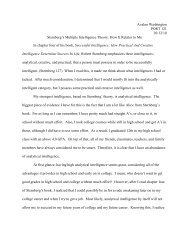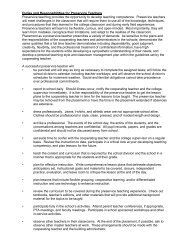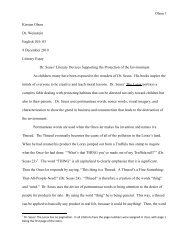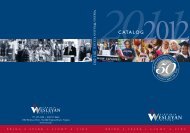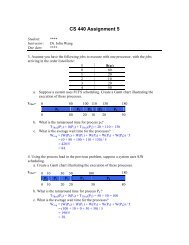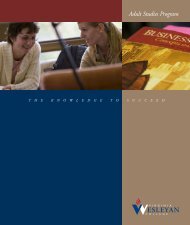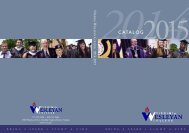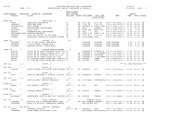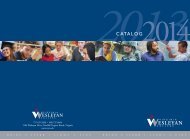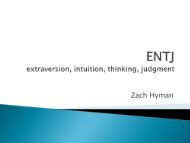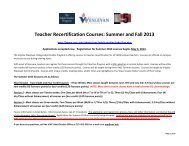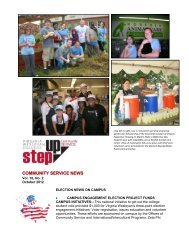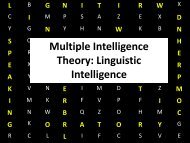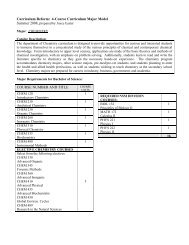2008-2009 Catalog - Virginia Wesleyan College
2008-2009 Catalog - Virginia Wesleyan College
2008-2009 Catalog - Virginia Wesleyan College
- No tags were found...
You also want an ePaper? Increase the reach of your titles
YUMPU automatically turns print PDFs into web optimized ePapers that Google loves.
138 PHILOSOPHY102 Contemporary Moral Issues (3) (V)Introduces the practice of moral reasoning through thestudy of representative moral theories and their applicationto controversial issues in contemporary life. Studentsdevelop the critical and analytical skills required forthinking clearly about moral problems and forming theirown conclusions about them. Offered each spring.104 The Examined Life (3)Introduces the practice of philosophizing through closereading and discussion of Socratic dialogues, includingEuthyphro, Laches, Lysis, Meno, Theatetus, Symposium andRepublic. The course engages with the substance ofSocrates’s peculiar questioning, (What is piety, courage,friendship, justice, virtue, knowledge, and so forth) but alsoreflects on the sort of knowledge that Socrates seeks, how hesearches for it, and why he thinks this activity is necessaryfor a well-lived life. Offered each fall.105 Meaning, Happiness andThe Good Life (3)(V)Examines key texts from philosophy and literature, Eastand West, on the meaning of life. We attempt to grapplewith questions such as “Can happiness be found in thefulfillment of our desires, or in their elimination?”, “Or inthe worship and service of a universal being?”, “Is ameaningful life a happy life?” and “What does the question“What is the meaning of life?” mean?” Offeredintermittently.109 Critical Reasoning (3) (C)The structure of the philosophical essay is examinedafter a brief introduction to some basic principles of logic.Teaches students how to write clearly and precisely. Offeredeach fall.110 Perennial Questions (3) (V)A critical examination of several great issues whichconfront us in modern philosophical thought including thequestion of the existence of God, the nature of ultimatereality, the sources of human knowledge, the principles ofmoral values, and the problems of aesthetic judgments.Offered each spring.209 Methods of Logic (3)A continuation of Phil 109, this course is anintroduction to first-order logic. Primary emphasis is placedon the translation of ordinary language into symbolicnotation and the application of formal proof techniques.The presentation of formal methods concludes with a briefexamination of selected questions in philosophical logic.Offered each spring.211 The Human Condition (3)A critical exploration of the possible meanings of“human being,” and how individuals might interpret theirown existence. Selected literary, scientific, and philosophicaccounts of being human are studied and criticized. Offeredintermittently.212 Practical Ethics (3) (V)Explores the potential of moral reasoning as a tool forconflict resolution and consensus building. Through aseries of practical exercises, students learn to use moralargumentation as a means of fostering constructive dialogueand mutual understanding. Students develop the ability tolisten carefully, distinguish real from apparent disagreements,discover common ground, and find creativesolutions to moral problems. Prerequisite: PHIL 102.Offered intermittently.215 Philosophy of Religion (3) (V)Addresses some major questions that have emerged inthe history of philosophy concerning the justification oftheistic belief, the meaning of religious language, the natureof miracles, and mystical experience. Offered on demand.221/321 Ethics & Health Care (3) (V)Foregoing life-sustaining treatment…procurement oforgans and tissue for transplantation…artificial reproduction…allocationof scarce health resources…AIDS: publichealth vs. private rights. Such issues in health careconfront all of us at some time both as matters of individualconcern and as issues of public policy. Students study theethical principles that should undergird decisions in healthcare. It focuses on the application of ethical principles toconcrete cases. Offered each spring.253/353 Social & Political Philosophy (3)A survey of important themes in the history of socialand political philosophy. Topics for discussion include:strategies for social change, the nature of political authority,the autonomy of the individual, anarchism, and democracy.Readings are drawn from classical and contemporarysources. Offered spring of even-numbered years.272/372 Beyond the Western Tradition (3) (V)We live in a world characterized by multiplicity,plurality, and difference. Students are provided with theopportunity to enter into frames of reference of people withdiffering experiences of, and assumptions about, the world.We are educated in this world to the degree that we areaware of our own boundedness, and that we become skilledin critically understanding and integrating the perspectivesof others. Examines the beliefs of Native Americans, WestAfricans, Chinese thinkers, and philosophers of India.Offered each spring.292/392 Alternative Futures (3)Is there hope for HUMAN beings? Can we forecastfutures as other than more of the same? What choices mightwe exercise in shaping futures? After initial reflections onthe human prospect, students working in groups areresponsible for conjecturing sensibly and usefully aboutpossible alternative futures. Topics include: future shock,coping, population, resources, war, environment, andgenetic engineering. Offered intermittently.



